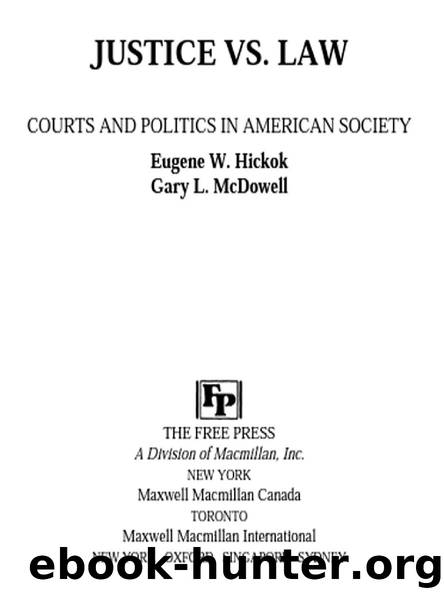JUSTICE VS. LAW by Eugene Hickok

Author:Eugene Hickok
Language: eng
Format: epub
Publisher: THE FREE PRESS
Published: 1993-07-15T00:00:00+00:00
5 CONSTITUTIONAL MORALISM
AND THE POLITICS OF
ADVICE AND CONSENT
T hat Melody DeShaney might seek constitutional relief for the tragedy that ruined her son’s life should come as no surprise. For many Americans, the Constitution is seen as a charter of fundamental justice and the federal courts as arbiters of competing moral claims. Surely what happened to Joshua was an injustice that the courts would remedy, for a larger issue was also at stake. The State of Wisconsin had failed to protect the welfare of an innocent child. And when the government fails to meet its obligation it is up to the courts to correct the problem. Here, then, was not just a private dispute over the welfare of a child but a public policy debate over the obligations of government.
As the courts have assumed a more prominent position in the policy-making process, the issue of judicial selection has acquired enhanced political significance. Simply put, as judges and courts wield more power, the issue of deciding who will become a judge has become politically very important. Con-stitutional moralism has taken its toll on the politics of advice and consent.
Indeed, it was the transformation in the politics of appointing Justices to the Supreme Court that made DeShaney v. Winnebago County such a significant case in the first place. When DeShaney was handed down, it seemed that Ronald Reagan’s dedication to the task of returning the courts to their proper constitutional place had paid off. Reagan sought to rein in the activism of the courts by appointing as judges individuals who agreed with his vision of a limited judiciary. Coming after the protracted and painful battles over William Rehnquist to become Chief Justice in 1986 and over Robert Bork to replace Lewis Powell in 1987, DeShaney seemed to suggest that the tide was turning and that the Court might be returning to its legal, constitutional, and historical roots. But within a few years, and after several more political skirmishes over judicial selection, it became apparent that the moralism of the modern judiciary would continue.
The political significance of DeShaney can be understood only in light of the confirmation wars that took place during the Reagan years and how they affected the Court. To understand those wars, it is necessary to place them in their proper historical perspective. While nominations to the Court historically have often been divisive and hotly contested, the judicial battles that took place during the Reagan years differed in both type and degree. The most immediate impact of this could be seen in the way Reagan’s successor, George Bush, approached judicial selection. But the true impact of the changing politics of advice and consent that began during the Reagan years is more subtle; it touches upon the way the role of the Court is understood in American politics and society today.
Download
This site does not store any files on its server. We only index and link to content provided by other sites. Please contact the content providers to delete copyright contents if any and email us, we'll remove relevant links or contents immediately.
American Kingpin by Nick Bilton(3886)
Future Crimes by Marc Goodman(3600)
The Meaning of the Library by unknow(2571)
Inside the Middle East by Avi Melamed(2357)
Why Nations Fail: The Origins of Power, Prosperity, and Poverty by Daron Acemoglu & James Robinson(2297)
On Tyranny by Timothy Snyder(2232)
Living Silence in Burma by Christina Fink(2071)
Putin's Labyrinth(2022)
The Mastermind by Evan Ratliff(1938)
The Smartest Kids in the World by Amanda Ripley(1856)
Think Like a Rocket Scientist by Ozan Varol(1821)
Law: A Very Short Introduction by Raymond Wacks(1748)
It's Our Turn to Eat by Michela Wrong(1731)
The Rule of Law by Bingham Tom(1698)
Philosophy of law a very short introduction by Raymond Wacks(1670)
Leadership by Doris Kearns Goodwin(1638)
A Dirty War by Anna Politkovskaya(1630)
Information and Communications Security by Jianying Zhou & Xiapu Luo & Qingni Shen & Zhen Xu(1621)
Civil Procedure (Aspen Casebooks) by Stephen C. Yeazell(1556)
